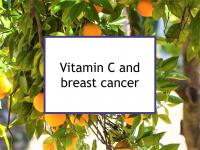Vitamin C (ascorbic acid) is vital to human health. High doses of vitamin C have been proposed as treatment for breast cancer. The case for such treatment is based, in part, on the observation that breast cancer patients tend to have low blood levels of antioxidants such as vitamin C compared to healthy women.
Such low vitamin C levels suggest that patients have exhausted the antioxidant defenses of the body and are vulnerable to oxidative damage that could further promote breast cancer. However, we are not aware of any academic studies that demonstrate a survival benefit for women being treated with megadoses of vitamin C.
Mixed result for supplemental vitamin C
Laboratory studies have reported that vitamin C at various concentrations inhibits human breast cancer cell growth. Relatively high intake of dietary vitamin C has been shown to be associated with lower breast density (a breast cancer risk factor) in young women.
However, large studies that have examined typical levels of vitamin C supplementation (included those found in multivitamins) have produced mixed results. Generally speaking, supplemental vitamin C has been found either to be weakly associated with improved survival or to have no impact on prognosis. One large prospective study reported that vitamin C supplement use was associated with increased risk of breast cancer in postmenopausal women who already have a high level of vitamin C intake from foods. No study has demonstrated a treatment benefit for intravenous vitamin C and researchers have for the most part abandoned the study of high doses of vitamin C as a potential cancer cure.
Avoid vitamin C supplementation during systemic treatments
There are two main theories regarding whether vitamin C supplementation is beneficial during treatment. As noted above, according to one theory, low levels of vitamin C suggest that patients have exhausted the antioxidant defenses of the body and should receive supplemental vitamin C. Under the second theory, supplemental vitamin C is capable of diminishing the effectiveness of treatment by protecting tumor cells from it. For example, vitamin C might protect breast cancer cells from radiotherapy. This is because radiation destroys cancer cells in part by generating high levels of free radicals. Antioxidants such as vitamin C have the potential to neutralize and nullify this mechanism of action.
Evidence concerning vitamin C during treatment
With respect to the first theory, supplemental vitamin C has been shown to improve the perceived well-being of patients during treatment, however evidence of an improvement in treatment outcomes is lacking.
In fact, there is some evidence of adverse treatment effects. One study demonstrated that vitamin C can protect breast cancer cells from tamoxifen, thereby potentially reducing its effectiveness. A 2024 study reported mixed results for the combination of high-dose vitamin C plus alpha-lipoic acid (administered intravenously) in a mouse model of triple negative (ER-/PR-/HER2-) breast cancer. Supplemental vitamin C has also been found to interfere with the treatment effects of Velcade (bortezomib), a proteasome inhibitor which is sometimes used for breast cancer.
In addition, it has been reported that glioma (a type of brain tumor) progression is faster in tumor-bearing mice treated with radiation plus vitamin C than in those treated with radiation alone. While brain cancer is in many ways dissimilar to breast cancer, the possibility that vitamin C could also protect breast cancer cells against radiotherapy is concerning.
Dietary sources of vitamin C
The following foods are good dietary sources of vitamin C while also having been shown to protect against breast cancer:
Please read the applicable food webpages when making your own food lists since these pages contain important advice, food rankings (e.g., highly recommended, recommended in moderation), consumption limits, and other pertinent information.
Vitamin C appears to act synergistically with other nutrients in the diet to oppose cancer. On the other hand, high doses of vitamin C may extinguish the anti-cancer effects of some other micronutrients known to be protective against breast cancer.
Bottom line
Most breast cancer patients, survivors and those at high risk are in a good position to obtain adequate vitamin C through diet. High dose vitamin C supplementation probably should not be used during radiotherapy, chemotherapy or tamoxifen treatment unless safe and effective dosages have been established.
Sources of information provided in this webpage
The information above, which is updated continually as new research becomes available, has been developed based solely on the results of academic studies. Clicking on any of the underlined terms will take you to its tag or webpage, which contain more extensive information.
Below are links to 20 recent studies concerning this topic. For a more complete list of studies, please click on vitamin C.
